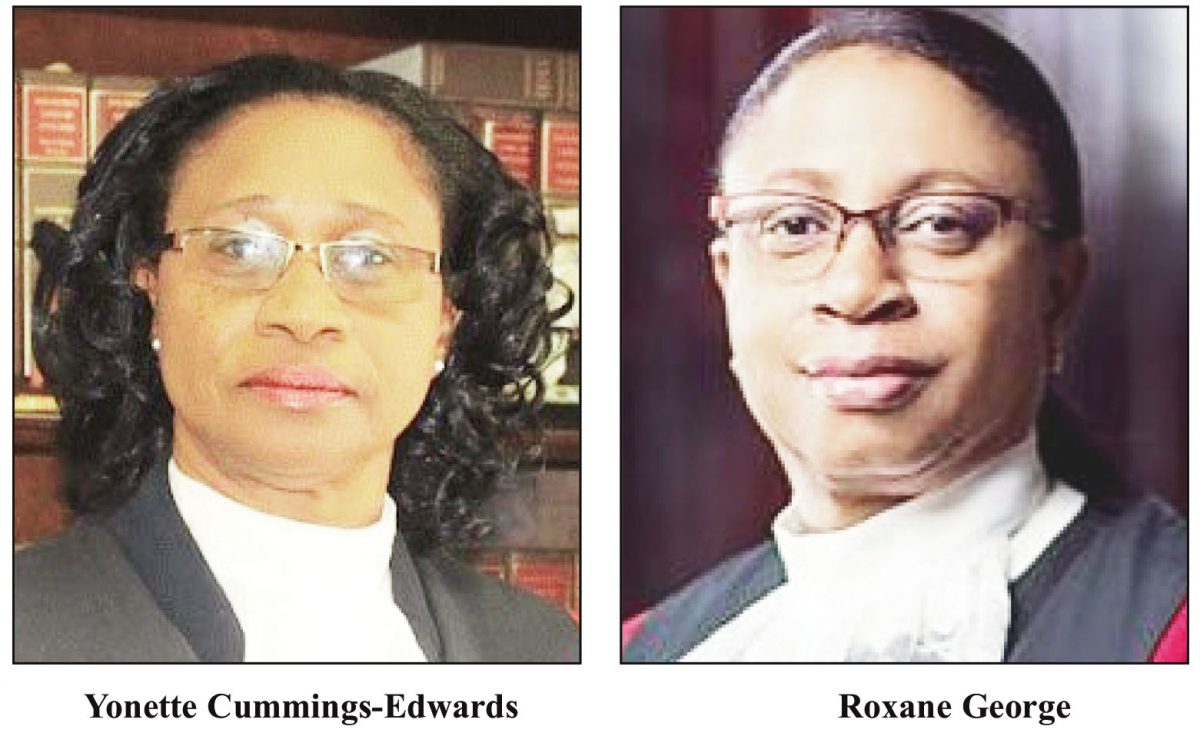Civil society group Article 13 yesterday called for the immediate confirmation of Chancellor of the Judiciary, Yonette Cummings-Edwards and Chief Justice Roxane George and said that the onus is on President Irfaan Ali to initiate the process.
In a statement Article 13 said “We consider it manifestly unfair not to confirm the incumbents who have acted in their positions for several years”.
Justice Cummings-Edwards and Justice Roxane George SC were respectively appointed acting Chancellor of the Judiciary and Chief Justice back in 2016 and 2017—weeks after the retirement of then acting Chancellor Carl Singh, who was also never confirmed despite having served for 12 years. Guyana has not had a confirmed Chancellor for 17 years and this attracted strong criticism last week from Justice Adrian Saunders, the President of the Caribbean Court of Justice (CCJ).
Article 13, which was formed last year, said it was dismayed that successive Administrations, Presidents and Leaders of the Opposition have been unable to agree on these appointments and have been unresponsive to calls to address this “egregious” state of affairs.
“In our view this failure shows a disregard for the Constitution and the rule of law and puts the judicial system of the country in a negative light. To blame the system or to call for its change is like advocating changing the system of free and fair elections because one political party does not want to play by the rules of democracy!”, the group declared.
Article 13, which had a meeting last month with a senior visiting US administration official, said that the President and the Leader of the Opposition (LOP), Aubrey Norton have taken an Oath to uphold the Constitution in its entirety, not partially.
“Article 13 considers that the onus is on the President to initiate the appointment/confirmation process and that he must do so forthwith. We consider it manifestly unfair not to confirm the incumbents who have acted in their positions for several years. If the President is not so inclined he must say so and offer reasons. Once the President begins the process, the onus shifts to the LOP to respond”, the group stated.
It said that the necessary reforms can then follow these appointments. It added that such reforms are not only necessary because of the political games which are standard fare in the political culture but importantly, because of the imperative to remove the association of the appointments of the top judicial officers from the political arena.
“Our success as a country will depend on good governance, adherence to the rule of law and the strengthening of our political culture. It will also require addressing equally pressing matters like the woefully inadequate number of judges in the High Court and the Court of Appeal. This demands attention but with will and imagination steps can be taken to address the problem”, Article 13 stated. It added that the recent batch of judges appointed under the APNU+AFC Coalition have performed commendably and any fear that the pool is empty may not be accurate.
“Regrettably, it is going to be much easier to draw from the AG’s Chambers, the Office of the DPP, the magistracy and attorneys in the public sector to make up the complement of judges our country so badly needs, than it is to ask private practitioners to give up their lucrative practice, even temporarily. With proper training, individuals chosen from the groups mentioned will rise to the occasion.
That should be a good start”, it contended.
Providing background on the current stalemate, Article 13 noted that Justice of the Court of Appeal Carl Singh retired in 2017, having acted as Chancellor from 2005, a period of twelve years. Justice Ian Chang demitted office in February 2016, having served as acting Chief Justice from 2010. Neither was confirmed at the dates of their retirement. Justices Cummings-Edwards and George have been functioning as acting Chancellor and acting Chief Justice from 2016 and 2017 respectively, to the present.
The group pointed out that under the 1966 Independence Constitution, it was the Governor General who had the power to appoint of the Chancellor and the Chief Justice “on the recommendation of the Prime Minister after consultation with the Leader of the Opposition”. The 1980 Constitution discarded the office of Governor General and transferred its appointing powers to the Executive President after consultation with the Minority Leader. A later amendment made as part of the Constitutional Reform process under the Herdmanston Accord, required “agreement” between the President and the Leader of the Opposition. Article 127 A of the Constitution now vests in the President the power and the duty to appoint a Chancellor and a Chief Justice “after obtaining the agreement of the Leader of the Opposition.”
Article 13 said that if the change was intended to advance the process, it has had the opposite effect with no appointment since the change.
Calling it a notable stain on Guyana’s judicial landscape, CCJ President, Justice Saunders last week called for the substantive appointment of a Chancellor and a Chief Justice to be made before this year ends.
“There is one significant blot on an otherwise impressive Guyanese legal and judicial landscape. For the country to have not appointed a Chancellor for 17 long years is very disappointing; likewise, to be without an appointed Chief Justice for several years. As the President of your final court, I believe I have a right and a duty publicly to express the view that Guyana should not let this year pass and not remedy this regrettable situation,” he said.
Justice Saunders was at the time delivering the keynote address to members of the legal fraternity during a dinner hosted by the Guyana Bar Association (GBA) at the Marriott Hotel.
With the recent election of Norton as Leader of the Opposition there is a rising expectation that President Ali will move to convene an early meeting.






